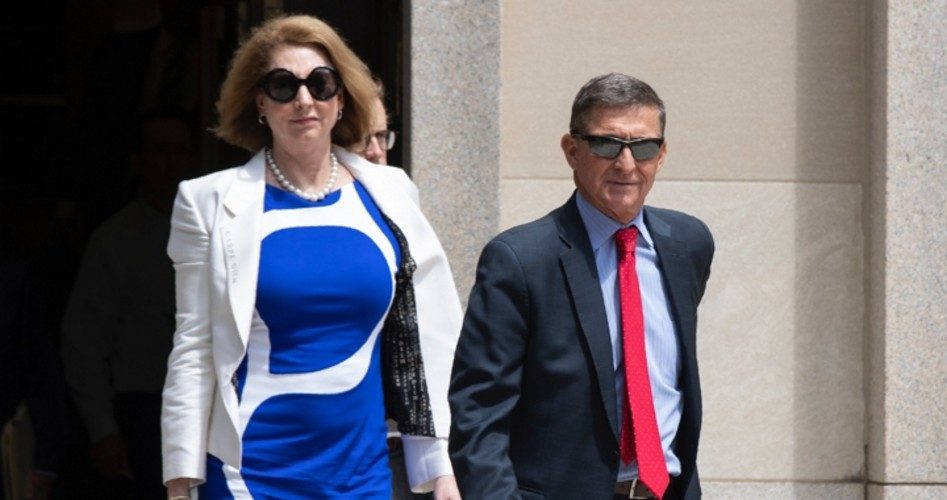
In the clash between General Michael Flynn’s lawyer Sidney Powell, and Judge Emmet Sullivan’s “friend” — former judge John Gleeson — Powell called out Gleeson’s claim on Wednesday that Sullivan should continue to prosecute Flynn even though the government has asked Sullivan to dismiss its case against him.
She said that the “irony and sheer duplicity” of Gleeson’s accusations “against the Justice Department — which is finally exposing the truth — is stunning.… It demonstrates the difference between a Department of Prosecutions and a Department of Justice. It shows how [only] the Department of Justice … has the power to walk into courtrooms and ask judges to remedy injustices.… The only lawful action this [three-judge panel of U.S. Court of Appeals for the District of Columbia] can take is to dismiss the case with prejudice on the Government’s motion [to dismiss] and vacate the plea.”
The plea is the key to understanding this continuing legal soap opera. The government sought to prosecute Flynn for lying to the FBI, only to learn later that he had been set up, and therefore the case against Flynn evaporated. A plea bargain gained under duress is not enforceable.
And Flynn was under duress. The FBI threatened to harass his son unless he, Flynn, agreed to plead guilty to lying to the FBI. As The New American (which has been following this soap opera for months now) noted, Flynn was innocent. In court he said, “I should have stood my ground firmly [when the plea agreement was offered] for what I knew to be the truth — that I did not lie to the agents.… Regretfully, I followed my [previous] lawyers’ strong advice to confirm my plea even though it was all I could do to not cry out ‘no’ when the Court asked me if I was guilty.”
Under normal circumstances, the request made by the government to Judge Emmet Sullivan to dismiss its case against Flynn would have been accepted, and Flynn would be allowed to restart his life.
But Sullivan decided that he wanted to prosecute Flynn for lying, and possibly for perjury as well. When Flynn’s new lawyer, Sydney Powell, took over, she saw what was happening and demanded that the appellate court force Sullivan to accept the government’s request to dismiss.
Sullivan not only refused, he asked former judge John Gleeson to make the case for him that Flynn was an exception and that Sullivan had every right to continue the case against Flynn. In other words, Sullivan wanted to take the place of the prosecution that now wanted to dismiss the case.
When one of the three judges hearing arguments in the case, Neomi Rao, asked what was wrong with Powell’s main contention — that the judicial branch cannot continue a prosecution as that power is only given to the executive branch under the doctrine of separation of powers — Alan Wall, representing the Justice Department working alongside Powell, responded, “They are as stark and concrete here as they come.”
Powell extended her argument to the appeals court that it should order Sullivan to dismiss the case against Flynn, saying, “[Sullivan’s court] exceeded its authority under the Constitution to solicit amici [friends supporting his position] and to appoint him [to make Sullivan’s case for him].” She added, “[Sullivan’s] friend simply ignores the indisputable, newly-produced evidence proving that it is General Flynn who was singled out for a baseless, politically motivated investigation and prosecution.”
Powell was just getting warmed up:
The irony and sheer duplicity of [Gleeson’s] accusations against the Department of Justice now — which is finally exposing the truth — is stunning. [Gleeson’s] filing is a “wrap-up smear.” It is an affront to the Rule of Law and a raging insult to the citizens of this country who see the abject corruption in this assassination by political prosecution of General Flynn.
[Sullivan’s court shed] any appearance of neutrality when it unlawfully appointed [Gleeson] as its own adversary to make these scurrilous arguments.
Once the arguments are heard by the three-judge panel — two of whom were appointed by Republican presidents and one by a Democrat president — the case against Flynn might finally be resolved.
Photo: AP Images
An Ivy League graduate and former investment advisor, Bob is a regular contributor to The New American, writing primarily on economics and politics. He can be reached at [email protected].
Related article:
Former Judge Urges Court to Deny Request to Dismiss Case Against Flynn



